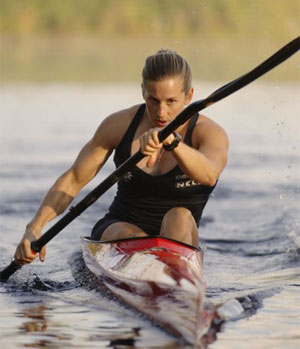 |
| Karen Furneaux started kayaking when her parents enrolled her in classes at the Cheema Aquatic Club in Waverley at the age of 12. |
Even on the phone, Karen Furneaux exudes serenity. Canada’s leading female sprint kayaker is gearing up for her third Olympic Games and has a good idea of what to expect once she arrives in Beijing.
“I feel really relaxed about the whole thing,” she says. She’ll be competing in two events: the women’s single 500-metre event (K1 500m) and, with Kristin Gauthier of Ottawa, Ont Emilie Fournel of Lachine, Que. and Geneviève Beauchesne-Sevigny of Trois-Rivières, Que., the K4 500m.
“I’m going to have fun and enjoy a bit of China.”
One of the veterans of the national canoe/kayak team, the 31-year-old has already been to two Olympic Games—Sydney in 2000 and Athens in 2004— as well as numerous other international competitions. She knows there will be music blasting over the water, lots of pomp and ceremony and pesky security line-ups that the athletes don’t normally have to deal with.
“I’m not going to be all frazzled and awestruck when I get there,” says the Dalhousie alumna from Waverley, N.S. “I kind of went through all that in Sydney.”
Besides, she’s a multi-tasker and knows how to deal with pressure. In 2000, for example, while preparing for the Olympics she was completing her first degree at Dalhousie—a Bachelor of Science (Honours) in Kinesiology. Her punishing training schedule includes long and short-distance running, weight training, cycling, swimming and cross-country skiing in the winter. Her mental preparation includes relaxation, breathing and yoga—“just to calm myself down.”
But nothing quite tops the year 2005, when she had one of her best seasons ever, winning medals in every distance in single-boat competition at the World Championships in Zagreb and ranking second overall in the world. That was also the year she was able to write her thesis for her master’s degree in kinesiology and sports psychology. Interested in “what makes coaches better coaches,” she interviewed her teammates and coaches as part of her research while at training camp. And what else? Oh yeah, she got married to Jeremy Koenig, a PhD candidate in biochemistry at Dalhousie.
“You can’t paddle forever, so it’s good to have another focus. For me, it was completing my master’s degree.” A university education isn’t unusual among the athletes who pursue paddling, says Ms. Furneaux. “Our sport has always attracted very intellectual and career-minded people: doctors, NASA scientists, you name it.”
She says she loved her time at Dalhousie and feels buoyed by the support she receives from classmates and professors in the Faculty of Health Professions’ School of Health and Human Performance. On the other hand, she wishes Dalhousie would better recognize the achievements of individual athletes in sports outside of the varsity system, athletes like herself and Olympic gymnast David Kikuchi. “I believe these athletes are also very positive role models.”
She finds her own motivation from within: “For me, it’s all about constant personal improvement—getting a little better everyday. I feel the best is yet to come and I’m really looking forward to it.”
